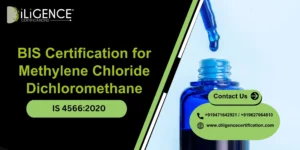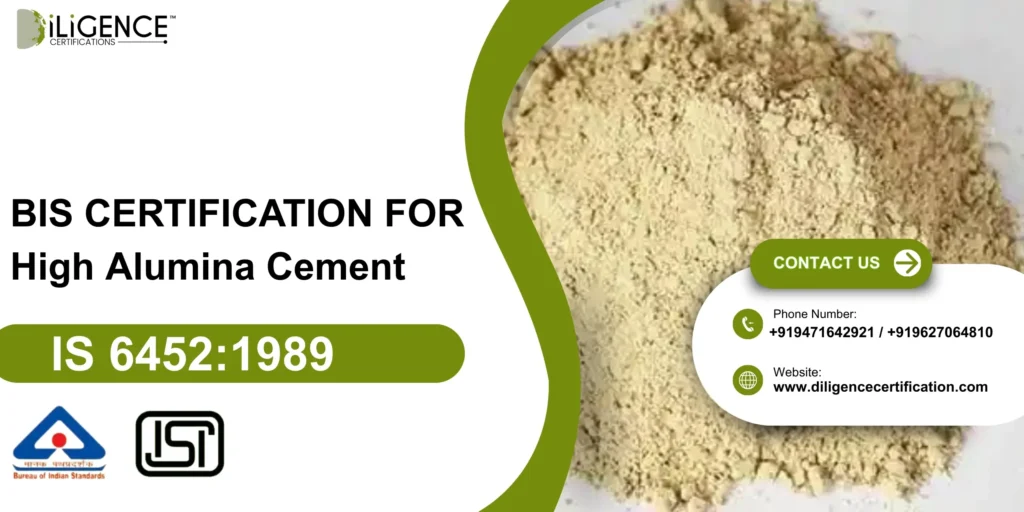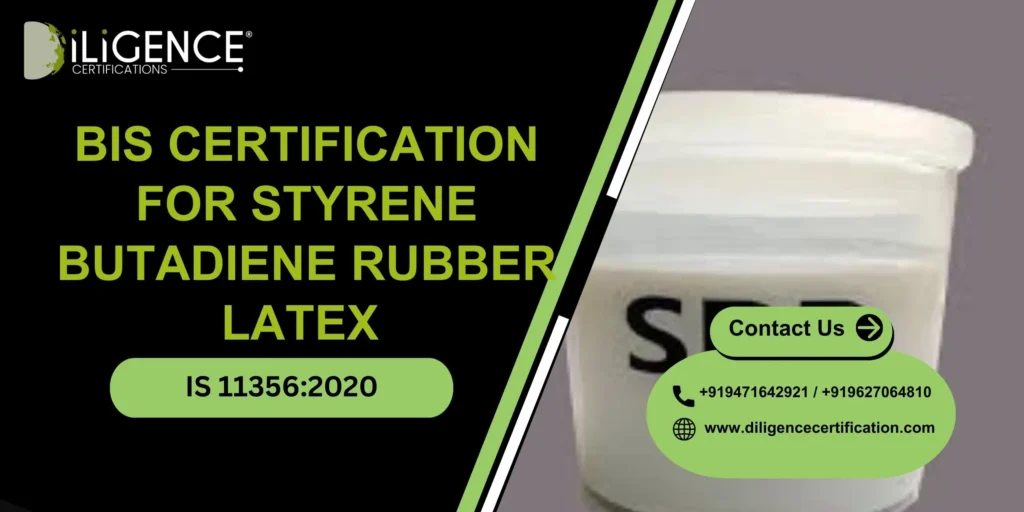- The ISI Mark found on High Alumina Cement is ascertaining that the cement is certified by BIS under IS 6452:1989 and meets the quality requirements.
- High Alumina Cement is known for its rapid strength gain as well as its capacity to resist chemical environments, and is used in tunnels, chimneys and marine applications.
- To obtain the ISI mark the manufacturer must make application to BIS and prepare the factory lab, and pass official testing.
- Upon certification, the company can sell its products legally, access government tender opportunities, and gain the confidence of its customers.
- There is a risk of heavy fines, seizure of stock and disqualification from larger projects when products do not have ISI approval.
Introduction
High Alumina Cement is a unique type of cement which gains strength in a matter of days and is far more durable towards water and chemical attacks than regular cement. Because of these properties, High Alumina Cement is used in situations such as tunnels, chimneys, marine construction and factory applications where normal cement would not last.
High Alumina Cement in India is a mandatory product to gain BIS Certification under the standard IS 6452:1989, when bought, tested, and approved, this certification provides a Transfer of Risk and proves to the user the safety of the product. The buyer then identifies the ISI mark on the product’s bag, and while there is no guarantee of quality, they are assured that the product has met a standard of quality defined within India.
Any supplier of High Alumina Cement supplying without BIS certification is illegal and carries consequences such as fines, product seizure, or rejection in large civil projects. Therefore without doubt every business should be getting BIS certification prior to selling into the Indian market.
What is BIS Certification for High Alumina Cement?
BIS Certification for High Alumina Cement is a stamp of approval from the Bureau of Indian Standards (BIS) which ensures this cement complies with quality and safety standards defined under IS 6452:1989.

Once a cement manufacturer obtains BIS certification for High Alumina Cement, they are authorized to print the ISI mark on their cement bags. The ISI mark signifies to buyers, contractors, and government agencies that this cement has undergone laboratory testing in multiple ways, and has been inspected by BIS officials and is safe to use for critical archaeological work.
Simply put, it is a certification of quality for High Alumina Cement in India. If it does not have this certification, no company is allowed to sell it under this mark, nor may they supply it for government work or for large infrastructure projects.
IS Standards Under BIS for Cement:
| IS Code | Cement Type / Specification |
| IS 12330 | Sulphate Resisting Portland Cement |
| IS 12600 | Low Heat Portland Cement |
| IS 1489 (Part 1) | Portland Pozzolana Cement – Part 1 (Fly-ash based) |
| IS 1489 (Part 2) | Portland Pozzolana Cement – Part 2 (Calcined clay based) |
| IS 269 | Ordinary Portland Cement |
| IS 3466 | Masonry Cement |
| IS 455 | Portland Slag Cement |
| IS 6452 | High Alumina Cement for Structural Use |
| IS 6909 | Super Sulphated Cement |
| IS 8041 | Rapid Hardening Portland Cement |
| IS 8042 | White Portland Cement |
| IS 8043 | Hydrophobic Portland Cement |
| IS 8229 | Oil Well Cement |
| IS 16415:2015 | Composite Cement – Specification |
| IS 16993:2018 | Microfine Ordinary Portland Cement – Specification |
| IS 15895:2018 | High Alumina Refractory Cement |
Importance and Benefits of BIS Certification for High Alumina Cement
- Legal Compliance – BIS certification is a legal requirement to sell High Alumina Cement in India and worth checking for compliance with IS standards.
- Quality Assurance – Helps ensure that the cement will meet essential benchmarks of strength, durability and performance.
- Credibility with Buyers – Gives buyers, contractors and engineers assurance and confidence regarding safety assurance.
- Market Eligibility – Allows for participation in government tenders as well as large projects with institutional and other commercial clients.
- Brand Value – Positive impact on the brand and reputation of the manufacturer at both national and international level.
- Gives a Competitive Advantage – Certified High Alumina Cement is more prominent and attractive than any other non-certified products. More selling opportunities.
- Safety of Structure – Ensures measures long-term performance in high temperature / refractory applications.
- Regulatory Compliance – Reduces risk of penalties and market trade/ supply restrictions.
Why BIS Certification Is Mandatory for High Alumina Cement Brands?
BIS Certification is a must for High Alumina Cement brands, as it ensures that the cement follows Indian safety and quality standards. Without BIS, brands cannot sell legally in India, cannot supply to government or big projects, and may create uncertainty in customers’ minds. BIS assures the customer that the cement is suitable for high quality, durable and reliable use in critical construction.
Eligibility Criteria for BIS Certification – High Alumina Cement
For Indian Manufacturers
- Must be a legally registered company in India.
- Should have a manufacturing unit for High Alumina Cement.
- Factory must have an in-house quality testing laboratory.
- Must follow IS 6452:1989 standards during production.
- Need to maintain proper quality control procedures.
For Foreign Manufacturers
- Must be a legally registered business in the home country.
- Should have a production facility for High Alumina Cement.
- Must comply with IS 6452:1989 requirements.
- Required to appoint an Authorized Indian Representative (AIR) to apply on their behalf.
- Need to get product samples tested in BIS-recognized labs in India.
BIS Certification Process for High Alumina Cement
For Indian Manufacturers (ISI Mark Scheme)
- Identify IS Code – Apply under IS 6452:1989 for High Alumina Cement.
- Online Application – Submit application via Manakonline portal along with required documents.
- Factory Setup – Ensure in-house lab facilities and proper quality control systems.
- Sample Testing – Cement samples are tested both in the in-house lab and BIS-recognized laboratory.
- BIS Inspection – A BIS officer visits the plant to verify manufacturing and testing processes.
- Grant of License – If compliance is met, BIS issues the ISI mark license.
For Foreign Manufacturers (FMCS Scheme)
- Application Submission – Apply under the Foreign Manufacturers Certification Scheme (FMCS).
- Authorized Indian Representative (AIR) – Appoint an AIR to act on your behalf in India.
- Sample Testing in India – Send product samples for testing at a BIS-recognized lab in India.
- BIS Factory Audit – BIS officials conduct a physical inspection of the overseas plant.
- Compliance Verification – Ensure conformity to IS 6452:1989 and BIS guidelines.
- License Grant – On approval, BIS issues the license to affix the ISI mark on High Alumina Cement bags.

Documents Required for BIS Certification of High Alumina Cement
- Application Form – Duly filled BIS application via the Manakonline Portal.
- Factory Registration Documents – Incorporation certificate / GST certificate / Partnership deed / MSME certificate.
- Factory Layout Plan – Details of manufacturing unit, production line, and laboratory.
- Manufacturing Process Flow Chart – Step-by-step process of High Alumina Cement production.
- List of Machinery & Equipment – Installed machines used in cement production.
- List of Testing Equipment – In-house lab details, testing apparatus, calibration records.
- Quality Control Documents – Internal test reports, quality manuals, and raw material records.
- Utility Documents – Electricity bill, water bill, etc., as proof of factory operation.
- Employee Details – Qualified technical staff and lab chemist details.
- Product Test Report – In-house and BIS-recognized lab reports proving compliance with IS standards.
- Trademark/Brand Certificate – Copy of registered brand/trademark (if applicable).
- Authorization Letter – If application is filed through a consultant/representative.
- Import-Export Documents (for Foreign Manufacturers) –
- Business License of the company
- Nomination of Indian Authorized Representative (AIR)
- Product test reports from BIS-approved labs
Common Challenges in BIS Certification for High Alumina Cement
Despite its benefits, manufacturers often face these roadblocks:
- Testing Delays from overloaded labs
- Non-Conformity During Audit
- Improper Documentation
- Infrastructure Gaps in Lab Setup
- Lack of Regulatory Understanding
Partnering with experienced consultants like Diligence Certifications can cut approval time by 40%.
The Costs of BIS Certification for High Alumina Cement
BIS certification costs for High Alumina Cement usually represent the filing of the application, mandatory product tests accomplished at a BIS accredited laboratory, factory inspections and maintaining the license. The actual costs depend on factors, including the size of the plant, the extent of testing and the compliance readiness.
Why Choose Diligence Certification?
For compliance and credibility, Diligence Certification is much more than a simple checklist — it provides true confidence in your business.
Diligence Certification encompasses all facets of making sure your business is ethical, responsible, and aligned with laws and industry best practices. It examines your company’s legal, financial and operational status — meaning that you are not just certified, but trusted.
Here’s why businesses rely on Diligence Certification:
- Stronger Risk Protection
It helps you spot hidden legal, financial, or operational risks early — so you can fix problems before they become threats. - Earn Stakeholder Trust
From investors to customers, people want to work with businesses that play by the rules. Diligence Certification proves you’re one of them. - Stay Legally Aligned
It makes sure your company is complying with laws not just regarding your products, but also labor laws, environmental laws, tax laws, and more. - Enhance Your Brand Reputation
Consumers respect ethical, transparent businesses. Diligence Certification shows the world that you operate with integrity.
- Stand Out from Competitors
In a crowded market, credibility is your biggest edge. Certification helps position your brand as reliable and responsible — not just another name.
Conclusion
BIS Certification for High Alumina Cement is more than just a legal requirement. It is an indication of Trust, Safety, and Acknowledgement in the Market. No manufacturer can sell or even distribute cement for sale in India without this certification, be it for commercial or Government associated potential projects with large Infrastructure contracts.
In conclusion, by fulfilling eligibility requirements, requesting documentation, and progressing through the BIS process sequentially, businesses can ensure compliance and develop long standing credibility in the market.
If you happen to be a HAC cement manufacturer or importer wishing to simplify your certification journey, then by way of expertise, money, time, and effort will be saved.
Frequently Asked Questions
What is BIS Certification for High Alumina Cement?
BIS certification is a mark provided by the Government of India which indicates the High Alumina Cement has been tested and is safe and of good quality.
Why is BIS Certification important for High Alumina Cement brands?
Without BIS Certification, cement companies cannot legally sell any of their products in India. It also provides a level of assurance to buyers.
Is BIS Certification mandatory for High Alumina Cement?
Yes, every High Alumina Cement brand is required to have BIS certification before selling to the market in India.
Who provides BIS Certification in India?
The Bureau of Indian Standards (BIS) is a government association that issues the certification.
Can foreign companies apply for BIS Certification?
Yes, foreign companies wanting to sell High Alumina Cement in India are also required to have BIS Certification.
What tests are performed for the BIS certification of High Alumina Cement?
Tests are performed to determine strength, setting time, safety, and overall quality of the cement.
How long does it take to get BIS Certification?
It can take between 3 – 6 months depending on document submission and how long it takes to test the product.
Can a brand sell High Alumina Cement without BIS Certification?
It is illegal and can lead to fines or a ban on the brand.
How long does BIS Certification last?
Normally, 2 years and then can be renewed afterwards.
Does BIS Certification help customers have more trust?
Yes. Customers like BIS-certified High Alumina Cement because it proves safety and quality.



 BIS Certification
BIS Certification
 CDSCO
CDSCO
 CPCB
CPCB
 LMPC
LMPC
 WPC Approval
WPC Approval
 Global Approvals
Global Approvals
 TEC
TEC
 ARAI
ARAI
 BEE
BEE
 ISO Certification
ISO Certification
 Drone Registration
Drone Registration
 NOC For Steel
NOC For Steel



















 Business Registration
Business Registration














 Legal Services
Legal Services
 Trademark Registration
Trademark Registration
 Copyright Registration
Copyright Registration
 Patent Registration
Patent Registration

















































